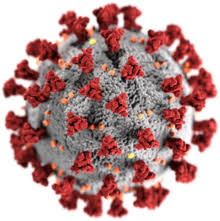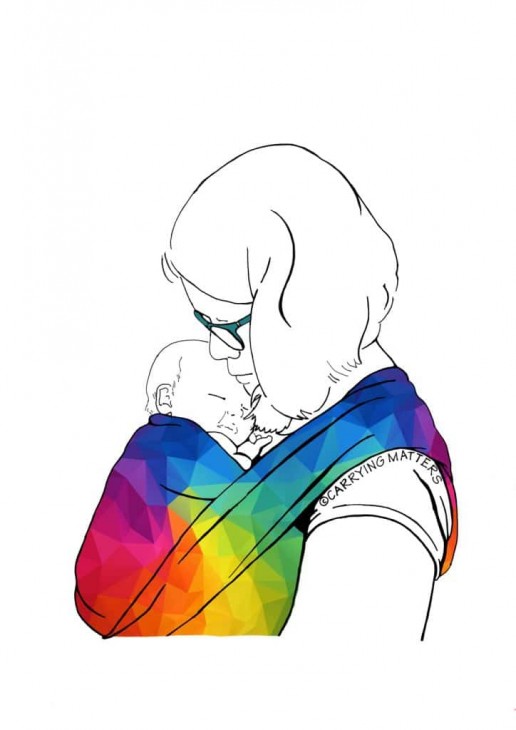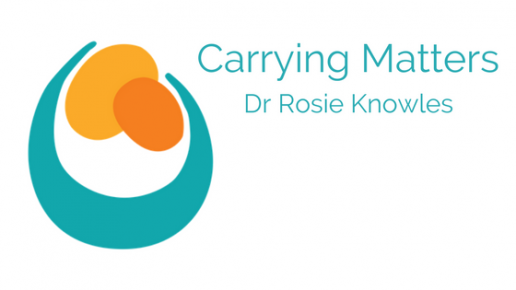We are certainly living in challenging times with the coronavirus, a global pandemic, schools and businesses being closed, restrictions placed on social activities, increased pressure on the health services, and a high level of collective anxiety.
Three of us in the local Sheffield sling scene felt inspired to write this blog post. We have all experienced how the closeness and connection of hands-free babywearing can help people survive very difficult situations and found it very therapeutic and calming. We wanted a community resource to serve our local community at this complicated and scary time.


- The brain can suppress feelings of helplessness and terror and put the body onto a form of autopilot, keeping it functioning whatever is going on.
- The brain can move the body into a heightened state of action, helping it to flee from danger or protect itself and its loved ones. The brain can freeze the body into stillness if flight is impossible.
- The brain can even detach the mind from what is happening to the body (dissociation).
These all have long term consequences for the body’s physical and mental health, which are closely connected.
Trauma is powerful; and knowing more about its effects allows us to find ways to heal ourselves and to have compassion and understanding for others.
People who are panic buying toilet roll or dried goods are displaying a reaction to the trauma they are experiencing; the fear, anxiety and uncertainty that come due to a lack of reliable information and an unseen enemy. They are not making a conscious choice to be selfish or refusing to think of others. The cognitive part of their brain has lost its normal control over their reactions, they are not really thinking at all, but reacting to their internal fears and protecting themselves.
Other people are carrying on as normal, as if nothing was happening. This is another form of response to trauma, denying that the traumatic situation even exists. It can be hard to believe that the storm is building fast on the horizon, when the sun is still shining in your back yard. It can feel easier to ignore it than to watch it coming and have to deal with it and make changes to normal life. Some people can feel detached from the world entirely, as if it isn’t real or that it’s all part of a story, a form of derealisation.
These are not “thought through”, rational reactions, but automatic responses to traumatic events for self-protection.
The effects of trauma can be physical as well as mental
Stress and anxiety have physical consequences too; racing heart, chest discomfort, burning feelings, sweating, insomnia, loss of appetite etc. Some people notice odd symptoms that they would normally ignore but take on extra significance during all the uncertainty. Normal life feels exhausting, because living with trauma, fighting a threat and trying to protect yourself is draining and takes up a huge amount of energy.
Does this feel like your experience?
Right now, as the news gets worse and the impact is being felt, our brains have effectively rung the fire alarm. When this happens, our logical cognitive brains shut down and focus on fighting the fire (or the trauma), and our bodies respond. Our children will also be experiencing this trauma, seeing the normal routines of their lives upset, watching and feeling their parent’s tension, so their reactions may seem unusual, and their behaviour out of place.
What can we do to help ourselves and our children?
We can take the time to understand what is happening to us all. With this knowledge we will feel more able to be gentle with ourselves and our children. We can try to be kind and sensitive to everyone’s needs right now, and allow everyone the space and time they need to process events and feelings. We can listen to each other and choose not to dismiss other’s concerns; everyone’s experience and feelings are valid. Acknowledging that the situation is traumatic in different ways reduces the expectations on everyone to function normally. It allows for everyone to be scared, and to be able to talk about it. Listening and accepting each other creates connection, which is a powerful tool for healing and survival; humans do better together than apart.
We can reach out to our local communities and find safe ways to provide emotional closeness as well as practical help. Take social distancing seriously. We will all have to make hard choices. Better to be able to say in a month, well, that was more cautious than we needed to be, rather than wishing we had done it differently.
We can allow ourselves to rest; it is tiring processing constantly shifting information, trying to survive and trying to protect your loved ones.
We can occupy our thoughts with things other than the current crisis; such as activities with the children, cooking, writing, drawing, reading.
We can learn how to “ground” ourselves when we feel rising anxiety. This helps to dampen the effects of trauma on our brains and bodies, by making a conscious choice to reattach your body to the positive parts of your present reality, rather than things happening “out there” or in the future. One way to do this is to do something that your body recognises as familiar and calming; for many this may be running or climbing, for some of us it will be physical contact and cuddles that help to activate the calming parasympathetic system.
Babywearing is one way to do this; keeping children close and safe, feeling the trust in their warm bodies snuggled up.
The familiar rituals of putting the carrier on and going for a walk, the swaying motion of helping a child drift off to sleep, the release of calming oxytocin are all very grounding. Right now, you and your child are together, building a relationship, and can provide each other with reassurance and focus. Your baby may not realise what is happening and just need you. Your older child may need your reassurance in this strange situation, and the physical proximity will provide that.
You are each other’s anchors in the gathering storm that will soon roar about our ears.

As the mum of a 19 month old and a three week old baby, born just before the enormity of what we are facing hit, babywearing is helping me get through every day. Uncertainty on this scale does not help an anxious mind. But now every day I turn to carrying my children as a way to find something familiar and calm. I put my older child on my back and go for a walk at the end of each day. We avoid other people but nod to those we pass, this little bit of connection with the outside world is so important to keep me sane. This big moment of connection to him brings normality and love into my day. I of course also carry my newborn as much as possible. What’s better than having a newborn in a sling! The first time I wrapped him it seemed so normal, like something in the world made sense. Having him wrapped is so calming and grounding. Having him right there gives me something good to focus on. Having his nervous system, which knows nothing of the enormity of global problems, bound together with mine, helps keep my nervous system calm. Together we all get through each day, one day at a time.
Please take this global pandemic seriously.
Further reading about staying at home and protecting others


